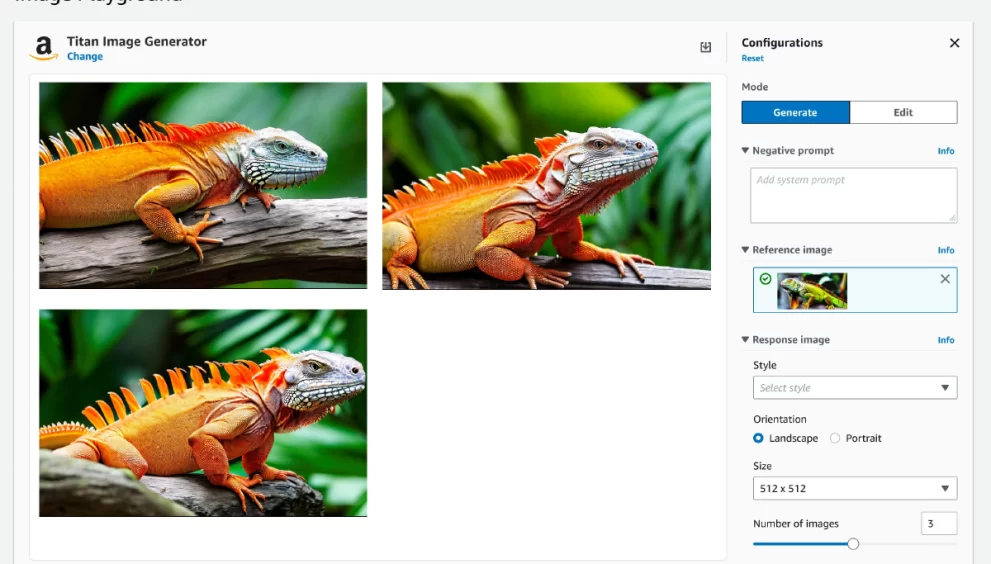Amazon finally releases its own AI-powered image generator at AWS re:Invent 2023

Amazon has introduced its image generator, Titan Image Generator, at the AWS re:Invent 2023 conference. Available in preview on the Bedrock AI development platform, Titan Image Generator, part of Amazon’s Titan generative AI models, can create or modify images based on text descriptions. The tool includes built-in bias and toxicity mitigations, trained on diverse datasets across various domains, and allows optional fine-tuning on custom datasets.
Amazon is releasing an image generator, following in the footsteps of countless other startups and tech behemoths that have previously done so.
Titan Image Generator was unveiled by Amazon this morning at a keynote address at its AWS re:Invent 2023 conference. AWS customers can now access Titan Image Generator in preview on Bedrock, the company’s AI development platform. Titan Image Generator, a member of Amazon’s Titan family of generative AI models, has the ability to either create new images or alter pre-existing ones in response to text descriptions.
Amazon is releasing an image generator, following in the footsteps of countless other startups and tech behemoths that have previously done so.
Titan Image Generator was unveiled by Amazon this morning at a keynote address at its AWS re:Invent 2023 conference. AWS customers can now access Titan Image Generator in preview on Bedrock, the company’s AI development platform. Titan Image Generator, a member of Amazon’s Titan family of generative AI models, has the ability to either create new images or alter pre-existing ones in response to text descriptions.
According to Amazon, Titan Image Generator has built-in bias and toxicity mitigations and was trained on a “diverse set of datasets” spanning a “broad range of domains.” It can also be optionally fine-tuned on custom datasets. (With testing excluded, of course, the effectiveness of those mitigations remains to be seen.) The business did not, however, disclose the precise source of those datasets or whether it has permission from or is paying all of the artists whose work was used to train Titan Image Generator.
Some companies that are making image generators, like OpenAI and Stability AI, let creators choose not to use training datasets. This change was made a few months ago. Others, like Adobe and Getty Images, are setting up author compensation plans, though they’re not always clear-cut or well-paid.
But Sivasubramanian did assert on stage that, in accordance with its AI indemnity policy, Amazon will defend users who are accused of infringing copyright on images created by Titan Image Generator. Customers of AWS who are concerned about regurgitation—the situation in which a generative model produces a mirror image of a training example—will undoubtedly find comfort in that.
Almost one-third of Fortune 500 companies surveyed recently by Acrolinx expressed that their primary concern regarding the application of generative AI was related to intellectual property. Nine out of ten developers “heavily consider” IP protection when deciding whether or not to use generative AI, according to a different poll.
He stated, “We’re carefully selecting the data we use and how we train our models.” “Our customers will have the freedom to choose the best models for their needs even as they grow and change thanks to these investments.”
As part of an effort to stop the spread of false information and misuse images produced by AI, photos produced with Titan Image Generator will also by default include a “tamper-resistant” invisible watermark, according to Sivasubramanian. (The most recent examples of how serious the threat has become are deepfakes from the Gaza War and AI-generated photos of child abuse.) We’ve contacted Amazon for clarification, but it’s unclear exactly what kind of watermarking technique they’re using or which tools outside of their own API will be able to detect it.
Sivasubramanian pointed out that watermarks are included in the voluntary AI commitment that Amazon and the White House signed in July. Some signatories, like Google and Microsoft, have created their own solutions or implemented the Content Credentials system created by the Coalition for Content Provenance and Authenticity.







